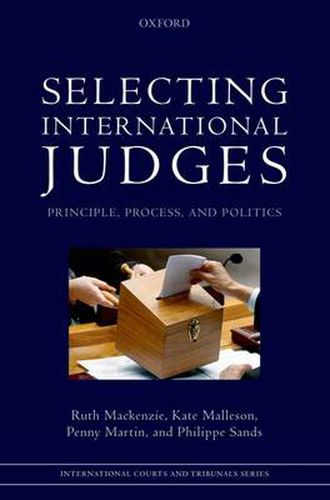Selecting International Judges: Principle, Process, and Politics
Ruth Mackenzie (Senior Lecturer in International Law, University of Westminster; Senior Associate, Centre for International Courts and Tribunals, UCL),Kate Malleson (Professor of Law, Queen Mary, University of London),Penny Martin (Research Fellow, Centre for International Courts and Tribunals, University College London),Philippe Sands QC (Professor of Law, University College London & Barrister, Matrix Chambers)

Selecting International Judges: Principle, Process, and Politics
Ruth Mackenzie (Senior Lecturer in International Law, University of Westminster; Senior Associate, Centre for International Courts and Tribunals, UCL),Kate Malleson (Professor of Law, Queen Mary, University of London),Penny Martin (Research Fellow, Centre for International Courts and Tribunals, University College London),Philippe Sands QC (Professor of Law, University College London & Barrister, Matrix Chambers)
This book examines the way international court judges are chosen. Focusing principally on the judicial selection procedures of the International Court of Justice and International Criminal Court, it provides the first detailed examination of how the selection process works in practice at national and international levels: what factors determine whether a state will nominate a candidate? How is a candidate identified? What factors influence success or failure? What are the respective roles of merit, politics, and other considerations in the nomination and election process? The research was based on interviews, case studies and survey data in a range of different states. It concludes that although the nature and quality of nomination and election processes vary widely, a common theme indicates the powerful influence of domestic and international political considerations, and the significant role of a small group of diplomats, civil servants, lawyers, and academics, often without transparency or accountability. The processes allow overt political considerations to be introduced throughout the decision-making process in ways that may detract from the selection of the most highly qualified candidates and, ultimately, undermine independence. This is particularly evident in the election campaigning that has become a defining feature of the selection process, accompanied by widespread vote trading and reciprocal agreements between states. The effect of these practices is often to undermine the role of statutory selection criteria and to favour candidates from more politically powerful states. The book reviews new judicial selection models adopted or proposed in other international and regional courts, and considers a number of proposals for change to promote more independent, transparent, and merit-based nomination and election procedures.
This item is not currently in-stock. It can be ordered online and is expected to ship in approx 4 weeks
Our stock data is updated periodically, and availability may change throughout the day for in-demand items. Please call the relevant shop for the most current stock information. Prices are subject to change without notice.
Sign in or become a Readings Member to add this title to a wishlist.


